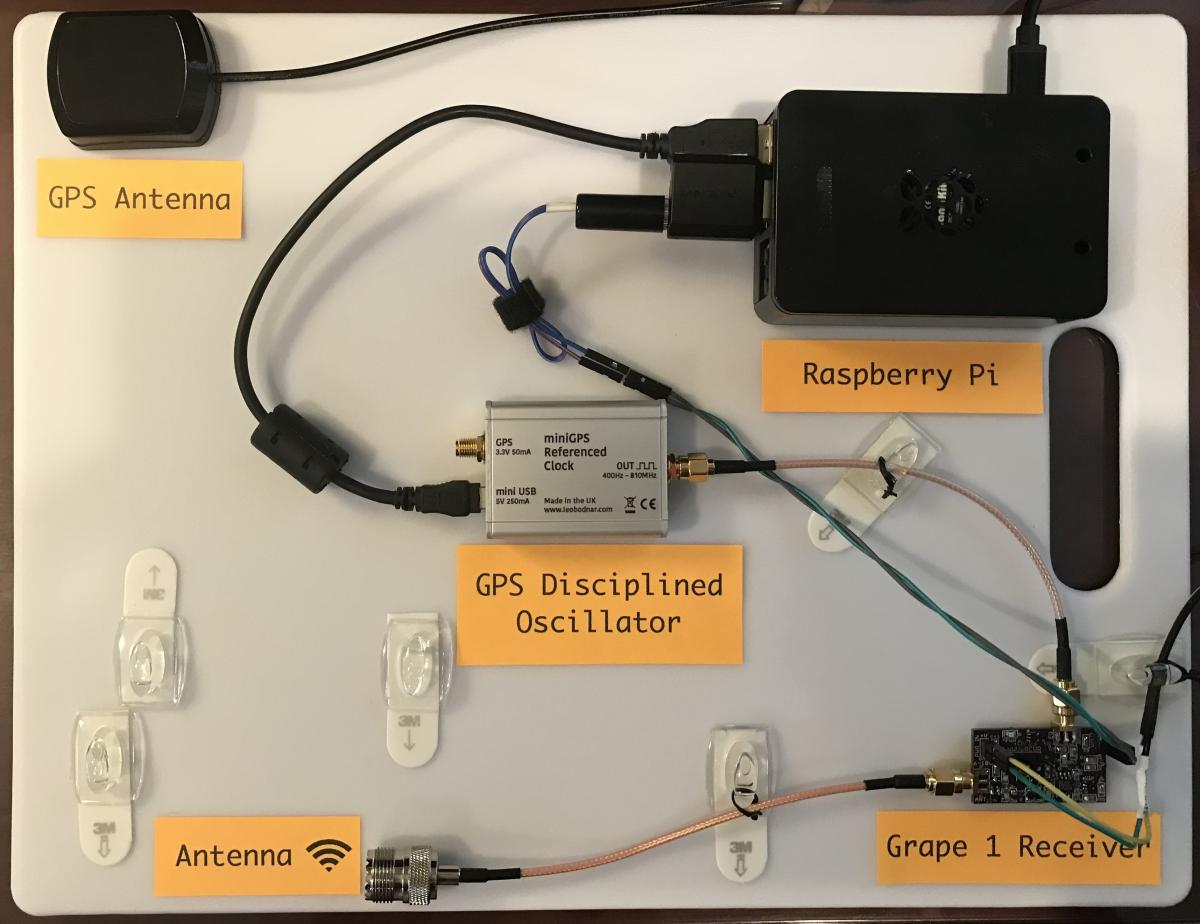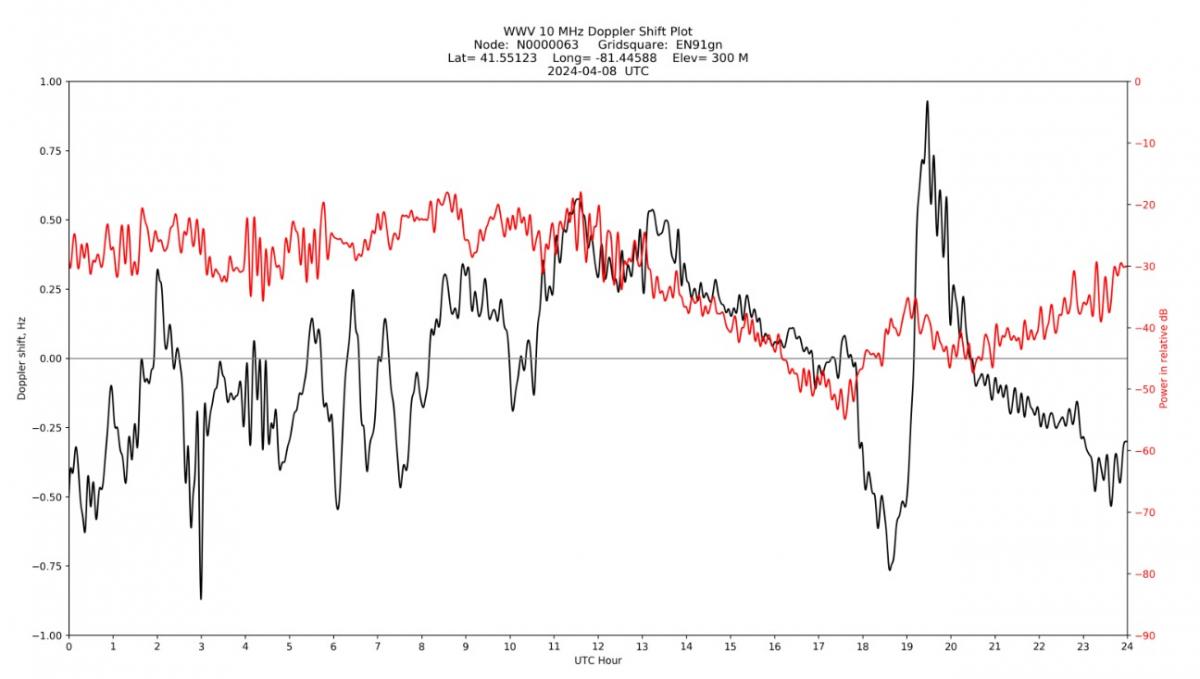GRAPE 1 fldigi - Overview, Specifications, Sourcing
 |
 |
Overview
The GRAPE 1 Doppler Monitor (fldigi version) is a key component of the HamSCI Personal Space Weather Station (PSWS). It functions well as a stand alone module; various versions have been providing scientifically useful Doppler shift data since 2019. The GRAPE 1 was designed with a specific purpose in mind: Receiving, analyzing and recording of signals from frequency standard stations such as WWV/H and CHU. The PSWS project involves monitoring changes in the Earth's ionosphere through measurements of Doppler frequency shifts on a 24/7 basis. One user's GRAPE 1 Doppler Monitor and that monitor's plot of Doppler shift vs. UTC hour from April 8, 2024 (the date of the recent North American total solar eclipse) appears above. (The solar eclipse's effect on the ionosphere is clearly visible between about 1800 and 2100 UTC.)
This particular vision of the GRAPE (GRAPE = Great Radio Amateur Propagation Experiment) is the lowest cost, easiest to assemble version of the GRAPE family. Hosting involves building a GRAPE low-IF receiver board, obtaining a GPS Disciplined oscillator, Raspberry Pi, providing reliable power, space for an antenna and an Internet connection. Other factors come into play, such as the need for visibility to the constellation of GPS satellites. Complete documentation (schematics, bill of materials) and instructions for building the GRAPE 1 low-IF receiver board, as well as configuring the GRAPE-specific Raspberry Pi image, are available on this website. Note: The GRAPE is a receive-only device. An amateur (ham) radio license is not required to operate a GRAPE 1 Doppler Monitor!
Specifications
| Purpose | Single frequency, low-IF receiver, used for measuring Doppler shift while receiving frequency standard stations such as WWV/H or CHU. Data is useful for studying bottom side motion of the ionosphere. |
| Frequency Selections | 2.5, 5.0, 10.0 or 15.0 MHz (reduced though very acceptable performance on 3.33, 7.58 or 14.36 MHz) |
| Frequency Stability | As stable as the Leo Bodnar GPS disciplined oscillator, approaching 1x10-12 |
| Sensitivity | Under review |
| Dynamic Range | Under review |
| Received Bandwidth | Under review |
| Current Hardware Version | See Builders Information in Sourcing section, below |
| Required Computer | Raspberry Pi 3B or 4B |
| Operating System | Raspbian OS |
| Required software | fldigi, a ham radio modem application, numerous GRAPE-specific shell scripts (all are included with the GRAPE-1 fldigi image - see Builders Information, in Sourcing section, below) |
| Data Repository | The GRAPE-1 fldigi data is freely accessible, available in the HamSCI Community on Zenodo.org |
Sourcing
Builders's Information: The GRAPE 1 is designed for the DIY enthusiast.
- The single-frequency receiver portion is built by the user on a PC board using surface mount components. Engineering and construction information for the GRAPE low-IF receiver board is available here
- Additional purchased components (GPS disciplined oscillator, Raspberry Pi, USB sound card, power supply) are programmed and/or interconnected to form a GRAPE 1 fldigi system
- Commercially built or DIY antenna suitable for your location, distance from time standard station, appropriate for frequency being monitored
This video (courtesy of the American Radio Relay League) provides an excellent overview of the GRAPE 1.12 low-IF receiver
Further Information
- Support is available from the HamSCI-GRAPE Google Group. All are welcome to join, ask questions, assist others on their GRAPE journeys.
- HamSCI explains The Science Behind the GRAPE Doppler Monitor
- In mid-October, 2023, while an annular solar eclipse which transited North and South America, over 50 GRAPE 1 systems were in operation, uploading research-worthy data. The GRAPE project contributors from that time period are noted on the GRAPE 1 Recognition and Acknowledgement page.
- The GRAPE 1 is just one module of the HamSCI Personal Space Weather Station (PSWS) Learn more here: Overview of the Personal Space Weather Station (PSWS)
Credits
The GRAPE Version 1 was designed by John Gibbons, N8OBJ, Lab Director of the Sears Undergraduate Electrical Design Lab, Case Western Reserve University, Department of Electrical Engineering. Additional software applications were written by David Kazdan, AD8Y, also of CWRU, and Bob Benedict, KD8CGH. Dr. Nathaniel Frissell, W2NAF, was the Principal Investigator on National Science Foundation grant 2002278 ('Collaborative Research DASI Track 1 - Personal Space Weather Station'). Their efforts were supported by additional NSF grants (1922972, 1932997) and these institutions:

